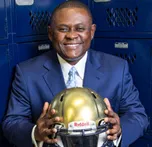Bennet Omalu, MD
2015 WebMD Health Hero, Scientist
Growing up
in Nigeria, Bennet Omalu, MD, dreamed of becoming a pilot. His parents
had other ambitions -- they wanted him to be a doctor -- so he
reluctantly enrolled in medical school. He settled on forensic
pathology, turning the investigation of death into a higher calling. "I
realized it was a very good platform for me to seek the truth," he says.
In September 2002, when legendary Pittsburgh Steelers center
Mike Webster lay on Omalu's table at the Allegheny County coroner's
office, something about the story of his death rang false. The official
cause was a heart attack, but Omalu had heard about Webster's erratic
behavior -- the violent outbursts and confused ramblings. Intuition led
him to delve deep into Webster's brain. There, he found clumps of tau, a
protein that often builds up in the brains of elderly people with
Alzheimer's, but had never before been seen in a 50-year-old football
player. "I searched and searched thousands of publications," Omalu says.
"I did not see any report on what I was observing. I just couldn't
believe it."
He named the condition chronic traumatic
encephalopathy, or CTE. And he thought the National Football League
would welcome his discovery. Instead, it launched an attack to discredit
his work. "It was a very lonely, painful experience," he recalls.
In
time, the lineup of players with CTE grew, and the NFL had to face the
issue. "The truth is like light," Omalu says. "You can cover it up for a
while, but you cannot conceal light." The league has put stricter rules
in place to limit head injuries, though Omalu says that won't solve the
problem. "As long as your brain is exposed to repeated blows … you have
a risk of brain damage," he says. "We have to educate people." He hopes
Hollywood will help. This December, Will Smith will play Omalu in the
film Concussion. "I think this movie will make a very big impact in
spreading the word."
Omalu's research has transformed the way we
look at -- and play -- football. Still, he remains humble. "I don't
want to be glorified. I don't want to be placed on any pedestal. I'm
just a simple man who wanted to make other people happy."

http://www.webmd.com/healthheroes/video-bennet-omalu-md?ecd=wnl_men_010816&ctr=wnl-men-010816_nsl-prmd_title&mb=%2fYEUKcm5jBiihqPGg%2fPGD2dEpmNqbUHLAOXXq3hWp98%3d

No comments:
Post a Comment